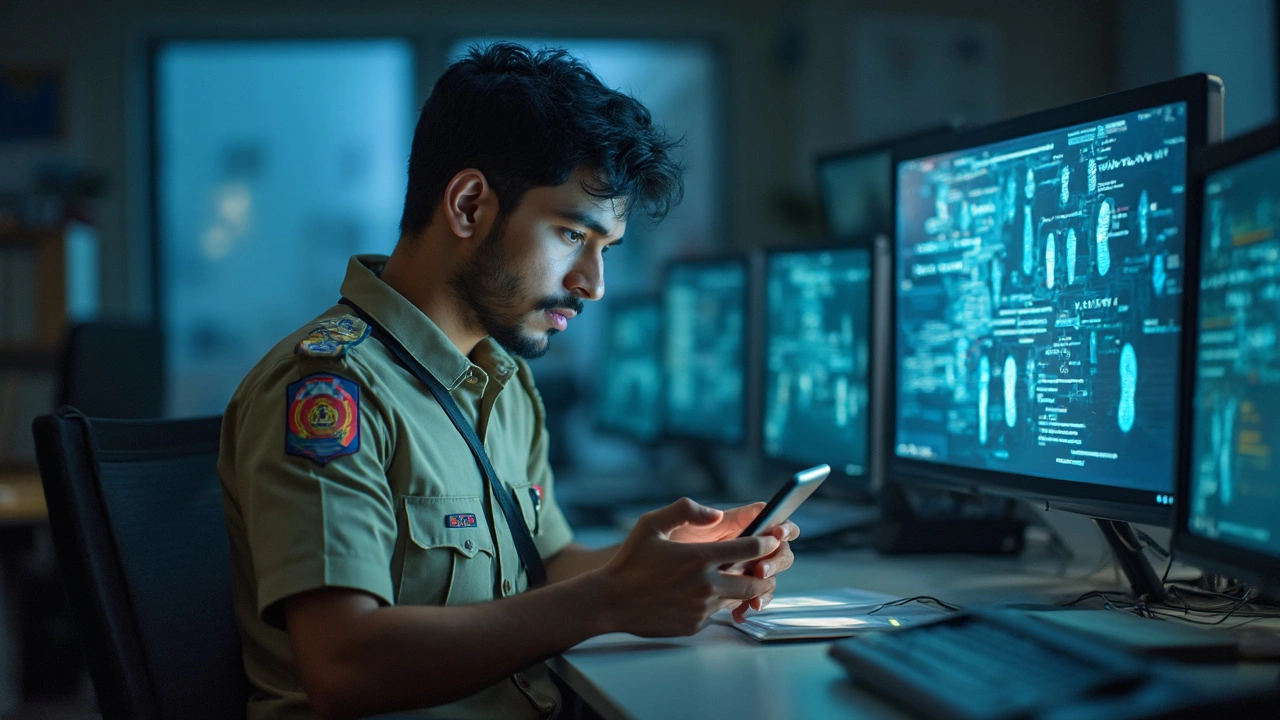If you get scammed online or hacked, it's natural to wonder if the cyber police can actually help. Some folks expect them to swoop in like movie heroes and fix everything in a flash. The real story is much more practical—and pretty interesting when you get into the details.
Cyber police aren't just regular cops with fancier gadgets. They've got training to track digital footprints, trace IP addresses, and even dig into your social media and chat logs (with proper permission, of course). They're the team set up to handle stuff like identity theft, online threats, and huge data leaks.
When a report comes in, it's not just a matter of "hacking back" the hacker. The process often means gathering digital evidence that will hold up in court. That can involve freezing accounts, tracking suspicious payments, or working with internet service providers to identify scammers. If the criminal is in another country, things get more complicated, but international cyber teams are more common today than you'd think.
So, if you ever wondered if cyber police just reset passwords for people, think again. Their job is about building a solid case and stopping cyber crooks where they can. The more you know about what they do (and don't do), the better you can handle trouble if it comes your way.
- What Are the Cyber Police, Really?
- How Far Can Their Powers Go?
- When Should You Call in the Cyber Police?
- Tips for Protecting Yourself Online
What Are the Cyber Police, Really?
Most people picture cyber police as some kind of digital secret agents. Think less James Bond and more skilled tech problem-solvers. Cyber police are sometimes called cyber crime units or digital investigation teams. They’re part of real law enforcement—usually a special squad inside the police or federal agency—trained to track, investigate, and shut down online criminal activity.
In countries like the US, you’ve got the FBI’s Cyber Division. Other countries have similar squads with names like National Cyber Crime Investigation Unit or Digital Enforcement Team. These groups don’t just work alone, either. They team up with other law enforcement, cybersecurity analysts, and even private companies when a case gets big or complicated.
So, what do they actually do every day? Here’s where it gets interesting:
- They investigate hacking, phishing scams, identity theft, ransomware, and child exploitation online.
- They use digital tools to trace online activity, even when cyber crooks try to cover their tracks by bouncing through different countries.
- They collect and store digital evidence, making sure it stands up legally in court.
- They sometimes coordinate with tech companies or banks to freeze funds and recover stolen data.
You won’t usually see them patrolling the streets. They spend most of their time dealing with piles of data, analyzing digital clues, and sometimes going undercover online. If you report a crime, these are the folks who make sense of the chaos and hunt down the people responsible.
So, the cyber police aren’t just tech support in uniform. They’re a specialized team using their tech skills to keep the online world safer for everyone, and they’ve become a big deal as more of life moves online.
How Far Can Their Powers Go?
The cyber police aren’t superheroes, but they sure aren't powerless. In most countries, these teams have serious authority to dig into digital crimes. When someone reports a scam or computer hacking, cyber police can legally demand digital evidence from companies, like phone records or email logs. They just need the right warrant, usually approved by a court. Sounds a bit intense, but it’s necessary. Imagine someone draining your bank account—waiting for permission could cost more than a few bucks.
Tracking hackers doesn’t stop at your local internet provider. If the trail leads overseas, the cyber police often team up with other countries. Europol, INTERPOL, and even the FBI have special cyber squads that share info. They coordinate on big cases, especially when huge groups are targeted or millions get stolen. Still, if the suspect is hiding somewhere without cybercrime laws, things can get sticky—sometimes an arrest is impossible, but international pressure does help.
There are limits. The cyber police can’t just snoop through anyone’s messages or computers without a reason. Privacy laws still matter a lot. They have to show they’ve got a real case before digging any deeper. Plus, many platforms like WhatsApp or Signal use end-to-end encryption, so even detectives might run into digital dead ends now and then.
Here’s what the cyber police can actually do if you’re a victim:
- Block or freeze suspicious bank accounts tied to online scams—fast, to stop the money from vanishing.
- Request user data from websites or social media, but only when the law allows it.
- Work alongside other specialists, like computer forensic teams, to recover deleted files or trace a criminal’s digital moves.
- Guide you through locking down your devices or recovering stolen accounts, especially if the threat is ongoing.
Basically, cyber police are your best bet when things go digital and ugly, but they have to play by strict rules. If you’re ever in trouble, don't wait—faster reports mean faster responses. Just don’t expect a movie-style hacking montage. What they do is more like smart detective work, just online.

When Should You Call in the Cyber Police?
It can be hard to know if something is serious enough to call in the cyber police. Some people wait too long because they're embarrassed or think the problem will just disappear. But when it comes to cyber police, time matters.
Here are the most common situations when you should reach out right away:
- Someone steals your identity online. If you spot accounts opened in your name, weird charges, or your photos being used by someone else, contact the cyber police. They’re set up to investigate identity theft fast.
- Threats or extortion over the internet. If somebody threatens to release private info or asks for money to keep quiet or return hacked data, that’s a police matter, not just an IT problem.
- Major online scams or banking fraud. Didn’t get paid for goods or services, or money disappeared from your account? The faster you make a report, the better the chance to follow the digital trail.
- Private images or videos leaked without consent. This is not only humiliating, but it’s also a criminal act in most countries. Save the evidence and reach out to law enforcement.
- Attacks on businesses, schools, or groups. If you run a business and spot a ransomware attack, phishing campaign, or obvious hacking, bring in the experts as soon as possible. They can help contain damage and collect crucial evidence.
If you’re facing an attack or a scam, don’t worry about bothering anyone—cyber police teams are ready for these calls. Here’s what helps when you make a report:
- Write down exactly what happened, with times and dates.
- Save messages, emails, or screenshots (don’t delete anything, even if it’s embarrassing).
- If money is involved, note account numbers, payment apps, or transaction details.
Some scams move so quickly that every hour counts. For example, a report from the UK's Action Fraud team showed that if people reported banking fraud within 24 hours, their odds of recovering money almost doubled.
| Scenario | Best Time to Report | Why Speed Matters |
|---|---|---|
| Bank fraud/online theft | Within 24 hours | Funds may be traced or frozen |
| Leaked private content | ASAP | To halt spread and remove material |
| Doxxing/threats | Immediately | Personal safety and evidence protection |
One last tip: Always use the official contact point, not random websites or "helpful" numbers from search engines. Local police cyber units, national reporting centers, and verified government portals are your safest bet. Many countries have 24/7 hotlines or online forms set up just for these emergencies.
Tips for Protecting Yourself Online
Staying safe online isn't just for techies. Anyone can (and should) take a few simple precautions. The first key step: use strong, unique passwords for every account. Don't settle for your pet's name and a birthday. Try mixing numbers, symbols, and random words. A password manager helps keep track.
It's just as important to watch for phishing emails and fake websites. Cyber crooks love pretending to be banks, delivery companies, or even the "cyber police" to steal your info. Double-check web addresses, and if you get an email urging you to click a weird-looking link or share private info, just don't.
Don’t skip updates for your software and apps, either. Most big security breaches happen through outdated software. Set your updates to automatic so you don’t even have to think about it.
Here are a few habits that really make a difference:
- Turn on two-factor authentication (2FA) wherever possible. It adds one more step for hackers—even if they have your password.
- Check your privacy settings on social media. Only share personal stuff with people you know and trust.
- Never reuse the same password across sites. One breach and all your accounts could be toast.
- Public Wi-Fi is convenient but risky. Don’t log in to sensitive accounts (like online banking) at coffee shops or airports unless you use a VPN.
- Back up important files somewhere safe. If ransomware hits, you'll be glad you did.
If something suspicious pops up, or if you notice unusual charges or logins, act fast. Report it to your bank, the website, or even the cyber police. Taking quick action can stop hackers from doing more damage. It’s not about being paranoid—it’s about making sure your life isn’t turned upside down by something preventable.
